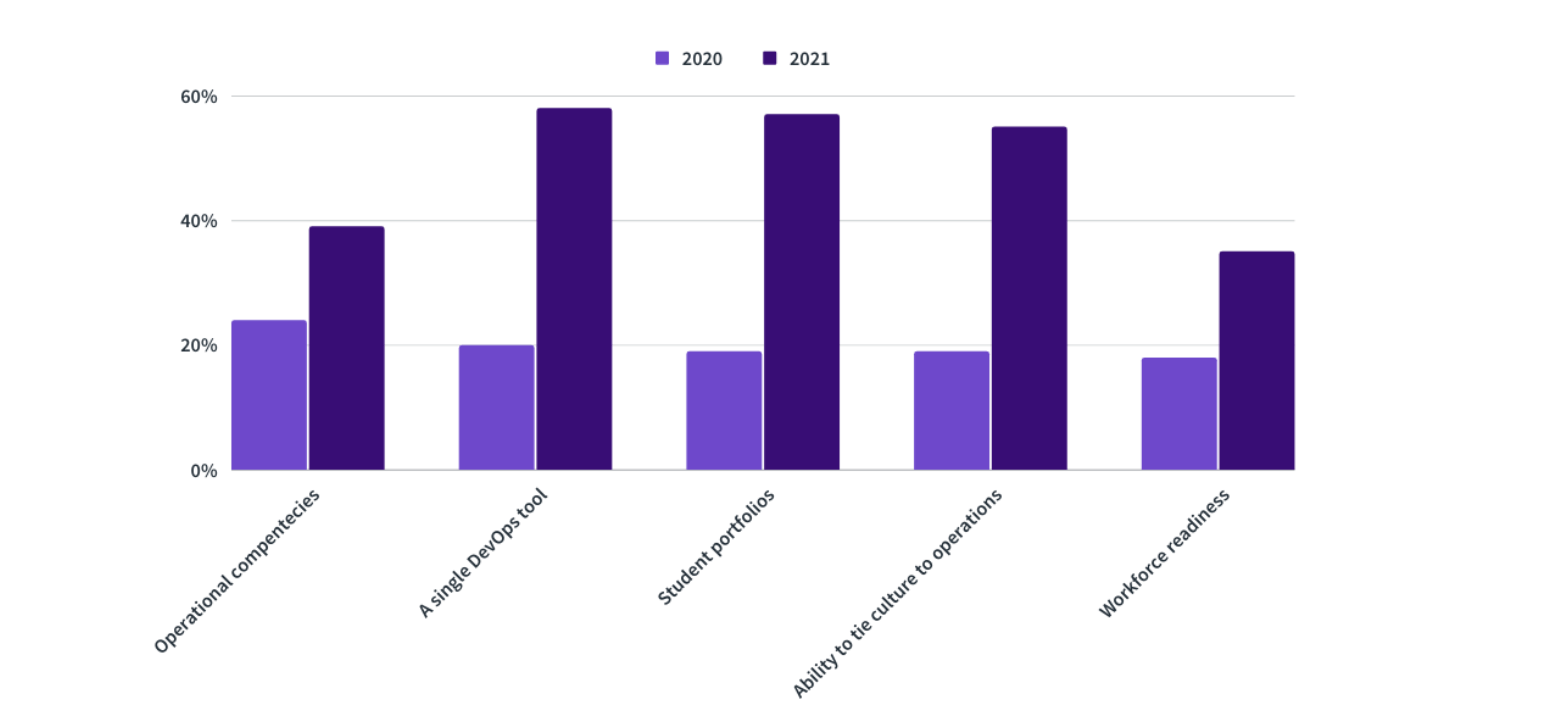In fall 2021 we launched our second annual DevOps in Education Survey. Over 460 respondents from all regions of the world shared insights on how DevOps and GitLab are transforming higher education.
Key findings
-
One platform for the win: Respondents' enthusiasm for teaching GitLab's single DevOps platform increased 190% over 2020; survey takers also pointed to the way GitLab can tie culture to operations as key (up 189% year over year), and they also value student portfolio management (up 200%).
-
CI/CD success: Academic institutions reported high rates of adoption of GitLab’s CI/CD features both within the classroom and in all other use cases.
-
Flexibility is key: Deployment flexibility stands out again as a major advantage of GitLab at institutions of higher education. Security and authentication are the primary drivers.
-
GitLab spreads the DevOps love: Multiple departments within an academic institution are reporting they’re now using GitLab and 21% of respondents said the ability to install multiple instances across a campus was a GitLab advantage (up 6% from 2020).
-
…and more spread = branching out: Because GitLab has one complete platform, higher ed. respondents report they’re expanding their DevOps footprint to include additional stages like Secure. The three most used stages in education continue to be Source Control Management, Plan, and Verify. Release and Package are also seeing nearly 30% adoption by respondents.
-
Planning features: Educators find planning features such as multi-level epics, issue tracking features, labels, and project management highly useful tools.
Why DevOps belongs in the classroom
The benefits of teaching or learning GitLab came through clearly in the survey. The fact that GitLab is a single DevOps tool was key for 58% of respondents, up from just 20% in 2020.
What are the benefits of teaching or learning GitLab?

How GitLab in education works
Deployment flexibility is critical to universities because security and server access can be controlled (81%), all while integrating with user authentication systems (54%). The ability to host multiple instances per institution was also a factor for 21% of respondents, up 6% from last year – another sign that cross-campus adoption is growing.
Advanced features (only available in the Ultimate tier) are used by 35% of respondents, which remained fairly consistent from 2020. Security features including container scanning, SAST, advanced security testing, custom DAST, and compliance management were among the most frequently mentioned. Multi-level epics and free guest users were commonly mentioned as well.
Use cases and DevOps stages
The most common use of GitLab in education was source control management with 53% of respondents actively using, followed by Verify (Continuous Integration) at 40%, Plan (issue tracking, labels) 38%, Manage (authentification, compliance management) at 28%, Package 29% and Release (Continuous Delivery) at 29%. The top four tools other than GitLab used by respondents were GitHub (76%), GitHub Actions (24%), Jenkins (26%), and BitBucket (17%).
Faculty respondents noted the value of bringing industry tools to the classroom. One wrote, “Thank you for the GitLab Program. It makes it possible for us to manage students' software engineering projects in a modern development environment.”
Leveraging GitLab to boost skills
The 2021 survey asked an additional question regarding what specific skills are being taught with GitLab in the classroom. The three top skills taught with GitLab are: CI/CD (40%), collaboration and communication (36%), application development and design (30%). Other key skills included understanding process flows and analytics, modern computer technology and architectures, and system architectures.
About the participants
Of the respondents, 35.9% have and use a GitLab subscription while 37% do not. The majority of respondents (78%) were at a university. There were 50 departments listed in the results; 40% were in a Computer Science Department and 32% in Information Technology. Of those respondents using GitLab, 23 departments were represented. These departments ranged across the academic disciplines including biology, economics, physics, business, and engineering. Respondents were 46% faculty and staff, 41% students, and 7% Administrators. We had a range of respondents from around the world: 39% were from North America, 28% from Europe, 18% from Asia 18%, and 9% from South America.
GitLab for Education
We believe that everyone can contribute. We are committed to bringing DevOps to education institutions around the world. We provide free, unlimited, top-tier licenses to qualifying educational institutions for teaching, learning, and research. Learn more here. And see all the results from the GitLab for Education 2020 Program Survey report.



